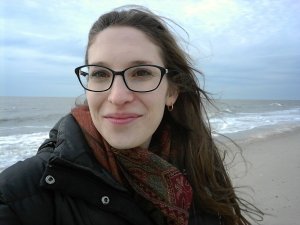
A collection of Poetry by Liza Katz Duncan. These poems were recently featured in the new BEI Edition, Geographies of Justice, and will be read on the Saturday, August 14th Reading series.
Love Song: I wanted to be surrounded by water
Tonight, at the end of the hottest summer on record
after three consecutive record-breaking summers,
my husband is hooking up the gas generator,
dragging the porch furniture into the shed. There’s a flood watch
until 8 P.M. tomorrow and people are bracing themselves
for evacuation. Some people don’t choose this. I did.
I wanted to be surrounded by water. To find home
easily on a map. To mark, on the shoreline,
its disappearance. I wanted my children to ride their bikes to the end
of the road, climb over the guardrail and watch New York
gleam across the bay. I wanted children, despite the dying world.
I wanted streets with names that were self-explanatory: Harbor Way.
Shore Concourse. I wanted to rename myself, too, for something
tangible. These are not good reasons, I know.
It made sense at the time, to see the disaster site
from our window. More honest, maybe. We weren’t afraid
to evacuate, to empty a flooded house. Couldn’t grasp, even, what there was
to be afraid of: we’d been there before. In my husband’s box of old papers,
there is a journal entry from the flood of ’92. They slept on cots
in a school cafeteria for days, waited in the dark.
The rest is history: the bay receded. Those who still had homes
went back. There were other floods, other children
who grew up and went away, or went mad. I did, for a time.
I had no ties to Boston, made no sense
against the backdrop of a city skyline,
but it’s also true, at sunrise, over buildings that blocked the sun,
migrating geese chalked fine ribbons of light through a violet sky
while the moon and streetlamps exchanged halos.
That is to say: I wasn’t here, not when it mattered most:
the wreckage, the cleanup, the fallout. The bay rising
so softly we barely noticed. Don’t misunderstand: this was the place
I had to write myself back into, if only to watch it fall apart.
Tonight, my husband and I drive to the bay to watch
the benign clouds, the sun sinking over the factories.
When we turn onto Shore Concourse, the water
is already at eye level. It’s not even
high tide yet. It is too much to fathom.
Early Spring, I tell Kristina about the baby
Kristina leaves her front door open.
I spend so much time here, she forgets
to apologize for the clutter on the table,
or for her daydrinking. Not that I mind.
Days like this, she’s so far gone
she barely remembers anything.
Winters, she forgets she lives here.
It’s easy to forget in the dark
when you don’t see the bay rising.
On everything she owns, a watermark:
a stain on the outside of the house. A ring
on the bookshelf where, carelessly, she’d placed
a mug of hot whiskey. Even her shin, where she’d rinsed
a cut from the blade of the car door.
You’d drink too, she told me,
if everything of yours had washed away.
Baby or no baby.
I thought she’d be happy for me,
but my happiness now seems
a luxury—I’m old enough, too,
to mother an eight-year-old child alone,
a girl already fleeing the house at every chance,
already turning to others for comfort.
I’m old enough to know
what it’s like when bay winds
shake the house, when the ocean
swallows the streets’ jagged edges,
but she smiles. No. You can’t know. Not yet.
I’ve found her, again,
thinking about drowning in the bay.
Her history of objects already
swallowed in it: coins, stones.
An Earthenware planter where, deadheading,
she’d cut her finger.
Glass bottles, measuring spoons.
You can’t know what it’s like,
she says. She’s right. The world that is dying
outside the snow-bright window
is not my world.
Not my Earthenware planter,
not my watermarked house.

